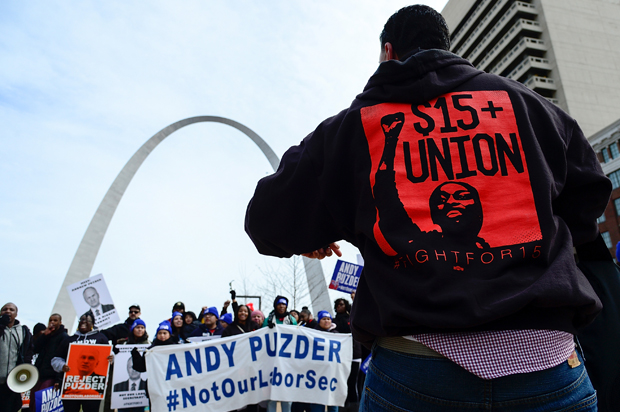While journalists and political junkies are focused on the latest implosion of the GOP effort to repeal Obamacare and gut Medicaid, conservatives in several states have been working to decrease the minimum wage that businesses can pay to their workers.
In Missouri, Republicans just passed a law overturning a local measure passed by the city of St. Louis that had raised the minimum wage to $10 per hour.
The new law will prohibit counties and cities within Missouri from creating their own minimum wage laws. It will also roll back the St. Louis minimum hourly wage to the statewide floor of $7.70.
Notably, Gov. Eric Greitens, a Republican, refused to sign the law, even though he spoke out in favor of it. Under the Missouri constitution, bills passed by both houses of the state assembly automatically become law.
In a news conference June 30, Greitens focused on procedural objections to the bill. He faulted the Republican-controlled Senate for utilizing a procedural loophole to block a Democratic filibuster of the measure, which had prevented it from being voted on until the final day of the chamber’s legislative session.
“I disapprove of the way politicians handled this,” Greitens said, as reported by the St. Louis Post-Dispatch. “That’s why I won’t be signing my name to their bill.”
The governor’s refusal to sign the law was interpreted as an at of cowardice by some Democrats.
“Signing it would have shown the fact that he is heartless and that he really doesn’t care about the working poor,” state Sen. Jamilah Nasheed told the Post-Dispatch. “So what he didn’t want to do is sign a bill to take money out of the pockets of those who already have an increase, but still do so.”
During the Senate delay, the city ordinance went into effect on May 5. It is unclear how many local businesses will reduce their employees’ wages to $7.70 after paying the higher $10 rate.
Missouri is not the only state where Republican elected officials have successfully targeted minimum wage laws. Until recently, such an action seemed like a conservative pipe dream. Thanks to a years-long hollowing out of the Democratic Party in rural and exurban areas, however, right-wing politicians have become able to pursue policies that were once impossible.
The GOP effort in Missouri came on the heels of an earlier success in March, when Iowa Republicans managed to roll back mandatory pay increases passed by local jurisdictions. It was the first time such a law had ever been passed, according to the National Employment Law Project, a liberal nonprofit group that supports higher minimum wage laws.
Terry Branstad, Iowa’s Republican governor, was decidedly more gung-ho in his response to the idea. He held a formal signing ceremony for the bill and spoke on its behalf, citing his desire for a single wage across the state.
“I think that uniformity is critically important, especially when you have communities that are in more than one county,” Branstad said as he signed the new law.
In February, Branstad said he did favor “a modest increase” in wages, however.
Advocates of lowering the minimum wage have also had success using lawsuits. In October, Kentucky’s Supreme Court overturned a 2014 Louisville ordinance that would have raised the city’s minimum wage to $9 an hour. In a 6-1 ruling, the court ruled that the local law violated the state constitution.
Republicans in Maine have also been successful at changing local minimum wage laws. While GOP efforts in other states have been opposed by low-wage workers, in the Pine Tree State, bartenders and restaurant employees appear to have assisted them and a number of Democrats joined in.
The unusual coalition behind decreasing wages in Maine highlights one of the emerging controversies in the debate over the minimum wage: whether employees who receive tips should be paid the same minimum wage as those who do not.
Under federal law, employers are required to supplement payments to workers who do not earn enough tips to reach the minimum wage threshold. The federal minimum wage for non-tipped employees is $7.25 per hour. Congress has not passed an increase since 2007.
Free-market advocates and restaurant industry representatives argue that adding tips onto a full minimum wage will cripple many food establishments by forcing them to raise prices or reduce staffing levels.
James Dill, a Democratic state senator in Maine, had resisted that position but changed his mind after he received hundreds of of emails and phone calls from waiters and bartenders asking him to support lowering the amount that tipped workers must be paid.
“I believe in a higher minimum wage,” he told the Washington Post. “But the people who this was impacting didn’t want it.”
The measure passed Maine’s House of Representatives 100 to 37 and cleared its Senate 23 to 12. Once it goes into effect in January, the minimum wage for tipped workers will return to the previous state minimum of $3.75 per hour.
During his 2016 campaign, President Donald Trump appeared to support raising the minimum wage requirement to $10 an hour. Since he assumed office, however, Trump has made no movement toward promoting the idea.
According to a poll released in June by the University of Maryland, 74 percent of respondents favored increasing the federal minimum wage to $10 per hour. Even 58 percent of self-identified Republicans supported the higher wage.


